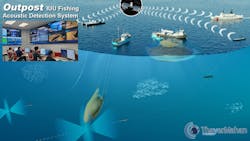Illegal fishing combatted with autonomous acoustic detection systems
In this week’s roundup from the Association for Unmanned Vehicle Systems International, which highlights some of the latest news and headlines in unmanned vehicles and robotics, autonomous acoustic detection fights illegal fishing and autonomous test vehicles navigate on roads in Munich, Germany.
ThayerMahan's autonomous systems prove capable of identifying, localizing and reporting IUU fishing
During operational testing and evaluation, ThayerMahan Inc. demonstrated that its Outpost and SeaWatch autonomous systems could identify, localize, and report illegal, unreported and unregulated (IUU) fishing, which has replaced piracy as the leading global maritime security threat according to the US Coast Guard's Strategic Outlook on IUU Fishing released earlier this year.
ThayerMahan demonstrated that its systems could detect and pinpoint fishing vessels based on their acoustic signature and electronic information during operations off Cape Cod and Key West. Compared with manned ships and aircraft such as those owned and operated by government and law enforcement agencies, a persistent unmanned search, detection, and reporting capability can be significantly cheaper for these operations, ThayerMahan says.
Persistent surveillance such as what ThayerMahan systems provided can help counter illegal fishing activities that threaten natural resources and economic livelihoods. ThayerMahan says that using unmanned systems at scale provides extensive geographic coverage at a fraction of the cost of traditional monitoring capabilities.
“Operational testing verified our unmanned systems can detect, localize and monitor IUU fishing vessels,” says ThayerMahan President and CEO, Mike Connor.
“Our systems provide a cost-effective way to deter illegal, unreported, and unregulated fishing that threatens our ocean's ecosystem and sustainable fisheries.”
Mobileye’s autonomous cars navigate freeways in Munich using cameras
On Tuesday, Dec. 15, Mobileye published an hourlong video of its test vehicle navigating urban and highway driving in Munich, Germany.
Using its technology that leverages crowdsourced data to map over 15 million kilometers (~9.32 million miles) of roads daily, Mobileye was able to drive autonomously within days of delivering the vehicle, the company says.
According to Mobileye, the vehicle reaches speeds of up to 130 kilometers per hour (~80 miles per hour) in the video, while also pulling off maneuvers such as navigating a left turn on green through an intersection. The vehicle was also able to avoid an opened car door, a bus pulled to the side of the road, and a vehicle that’s parallel parking; execute an unprotected left turn and lane changes on a highway; and move around stopped emergency vehicles and down a narrow, congested street.
Acquired by Intel for $15.3 billion in March 2017, Mobileye is building two independent self-driving systems. One is based entirely on cameras, while the second incorporates radar, lidar sensors, modems, GPS, and other components. Mobileye says that the vehicle shown in the video is using its camera-only subsystem, which runs on two of the company’s EyeQ 5 systems-on-chips processing 11 cameras, along with lidar and radar for redundancy.
Mobileye is able to conduct tests like the one captured in the video thanks to German certification body TÜV Süd awarding the company a recommendation for a permit to drive its autonomous vehicles on public roads in the country in July. By the end of this year, Mobileye expects to scale open-road testing in other countries, including Israel, France, and South Korea.
Compiled by Brian Sprowl, Associate Editor, AUVSI
Share your vision-related news by contacting Dennis Scimeca, Associate Editor, Vision Systems Design
SUBSCRIBE TO OUR NEWSLETTERS
